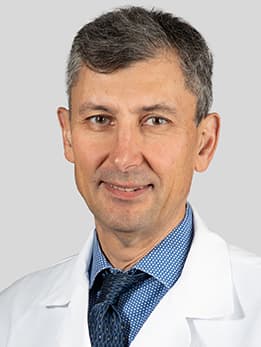Ovarian cancer researchers identify key genetic targets for chemotherapy-resistant patients

The most common type of ovarian cancer is high-grade serous ovarian carcinoma (HGSOC), which accounts for up to 70% of all ovarian cancer cases. These patients are often diagnosed at an advanced stage (III or IV) and the disease is associated with high mortality. First-line treatment for these patients is a combination of surgery to remove tumor tissue and chemotherapy.
“Most of the HGSOC patients initially respond well to chemotherapy; however, in the majority of cases, it is highly likely that the cancer will return and become less responsive to chemo over time,” said Melissa Javellana, MD, a gynecologic oncologist at the University of Chicago Medicine. “Due to the lack of definitive predictive markers, it’s very hard to know how durable each patient’s response to therapy will be. Often, how the cancer appears to respond on medical imaging doesn’t match what is seen looking at tissue samples under the microscope. Neither of these tools are good at predicting if and when the cancer will return, which challenges the management of these patients.”
The findings could help scientists identify molecular targets for developing novel therapies for chemotherapy-resistant patients.
The latest treatment strategies have focused on treating these patients first with chemotherapy to shrink the tumor tissue followed by surgery to remove as much of the tumor as possible and then continuing chemotherapy treatment. This approach has resulted in improvements for some patients, however, there are still those whose disease rapidly returns. This begs the question of why some patients respond well, with a remission period of at least six months, while others have a short-lived response to chemotherapy. These patients whose cancer returns in under six months are considered “chemotherapy-resistant.”
A team of researchers led by Ernst Lengyel, MD, PhD, Arthur L. and Lee G. Herbst Professor and Chair of Obstetrics and Gynecology at the University of Chicago Medicine, conducted a study to address this question. The findings could help scientists identify molecular targets for developing novel therapies for chemotherapy-resistant patients.
First, the team set out to investigate the changes that chemotherapy caused on a tumor’s genetic makeup. They used DNA and RNA sequencing on matched tumor samples that were collected from HGSOC patients pre- and post-chemo treatment. They also evaluated germline mutations, or mutated genes that are passed on to offspring, in these patient samples and found BRCA1 mutations in 3, or 10%, of 34 patients and a BRCA2 mutation in 1, or 4% of total patients.
Analysis of RNA sequencing revealed that gene expression of 77 genes went up (upregulated), and for 15 genes it went down (downregulated) after chemotherapy. Out of the genes that were upregulated, those that stood out to the researchers were the AP-1 transcription factor network genes, which showed consistently high expression in chemotherapy-resistant patient samples. Interestingly, there is not much change in gene expression including AP-1 transcription factor in chemotherapy-sensitive patients, suggesting that chemotherapy therapy resistance is partially induced through upregulations of these genes.
“Changes in AP-1 transcription factor genes have been well documented in the ovarian cancer literature and thus AP-1 was our primary focus for our follow-up experiments,” said Javellana, who was first author on the study, which appeared in Cancer Research. “We are more interested in this transcription factor as it is predominantly tumor-promoting. But it doesn’t mean other upregulated genes are not important and these are possible areas of focus in our future studies.”
She and her co-authors hypothesized that inhibiting AP-1 transcription factor genes could decrease tumor burden. To test their hypothesis, they treated chemotherapy-resistant cell lines with the AP-1 inhibitor, a drug called SR11302, combined with chemotherapy and found an increase in cell death compared to chemotherapy alone treatment, suggesting that AP-1 activity is induced by chemotherapy and may contribute to cancer cell survival.
Javellana highlighted that there are several AP-1 inhibitors that have been developed and undergone preliminary testing in humans. It is possible to consider targeting AP-1 for chemotherapy-resistant HGSOC patients. She also mentioned that amplification of chromosome 11q23.1, which encompasses salt-inducible kinase 2 (SIK2), was associated with chemotherapy resistance in patients.
A small-molecule inhibitor of SIK-2 is currently under investigation by researchers at The University of Texas MD Anderson Cancer Center for the treatment of recurrent ovarian, primary peritoneal and fallopian tube cancers. Although the UChicago study provides insight into the molecular mechanisms underlying chemotherapy response in HGSOC, future studies may reveal the adaptive and evolutionary processes underlying the response of tumor cells to chemotherapy, which may allow scientists to develop effective treatments for patients with HGSOC.
“Since there is unfortunately no cure for this disease once it relapses, we need better therapies than traditional chemotherapy to effectively treat a larger percent of this patient population,” said Javellana. “For gynecological cancers, we have made a lot of strides in treating patients in more sophisticated ways, for example, with small molecule inhibitors, targeted therapy and immunotherapy. These therapies have shown some promising outcomes and are well-tolerated by the patients compared to traditional chemotherapy. That’s where the future is going.”
Additional authors of the study, "Neoadjuvant Chemotherapy Induces Genomic and Transcriptomic Changes in Ovarian Cancer," included Mark Eckert, Janna Heide, Katarzyna Zawieracz, Melanie Weigert, Sarah Ashley, Elizabeth Stock, David Chapel, Lei Huang, S. Diane Yamada, Ricardo Lastra, Mengjie Chen of the University of Chicago and Ahmed Ashour Ahmed of the University of Oxford, United Kingdom. The study was supported by funds from the National Cancer Institute of the National Institutes of Health and Tempus.

Ernst Lengyel, MD, PhD
Ernst Lengyel, MD, PhD, is the Arthur L. and Lee G. Herbst Professor of Obstetrics/Gynecology and chairman of the Department of Obstetrics/Gynecology at UChicago Medicine. He is an internationally known expert in the research and treatment of gynecologic cancers.
View Dr. Lengyel's physician profile
Ovarian Cancer Care
UChicago Medicine gynecologic oncologists provide the full range of advanced diagnostic and treatment options for ovarian cancer, including access to new therapies available via clinical trials.
Learn about our ovarian cancer care